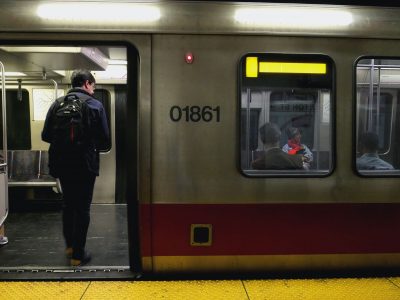
A Massachusetts Bay Transportation Authority Red Line train struck and killed a passenger early Sunday morning, causing residents to call the safety of the MBTA into question.
The 66-year-old man was struck near the northbound tunnel in Porter Square. The Boston Police Department said no foul play was suspected, and the Red Line train has since resumed normal service.
On Monday, just one day later, The Boston Globe published a report describing the eroding state of the T. The story listed multiple issues with MBTA stations, including out-of-service elevators at Aquarium, falling concrete at the Alewife parking garage and leaky ceilings at Porter Square.
Massachusetts Sen. Patricia Jehlen has appeared twice before the MBTA’s oversight board in recent months to complain about T conditions. For her, “it’s not just the stations” that need repair.
“The T is wisely focusing on switching systems and the cars, but in the process, they don’t have the capacity to keep the stations and garages in a state of good repair,” Jehlen said. “And, they’re not willing to say we need more revenue for that.”
The MBTA released a preliminary review of the conditions of its facilities to comply with a new reporting requirement from the Federal Transit Agency. Fifty-seven percent of stations and garages scored two or fewer out of five, meaning that the area needed significant repairs. Out of 378 properties, 78 of them scored just a one.
These ratings are consistent with Boston residents’ attitudes toward the MBTA. On Yelp, the T has an average rating of two out five stars from 269 reviewers. There are 13 five-star reviews, compared to 124 one-star reviews.
One Brighton resident reviewed the T as “simply, the worst!” A Malden resident had a similar reaction, writing, “this is probably the worst train system a city can offer to its citizens.”Both were one-star reviews.
While the primary issue is safety, Jehlen said, the MBTA is also being wasteful with their repairs.
“When you do a patch or bandage and then, eight years later, you’re back there to fix it, that’s a waste of costs,” Jehlen said. “They’ve just been falling farther and farther behind on their maintenance.”
On the MBTA website, the T primarily informs riders about who to call if they see something suspicious and also lists the violations passengers can be fined for. There is no mention of safety protocols, in regards to maintenance, of their stations.
In the draft of the MBTA Strategic Plan released in April 2017, the MBTA’s fiscal and management control board wrote that the safety goal of the organization was “ensuring an organization-wide commitment to managing safety risk and assuring that all transit activities are adequately resourced and supported to achieve the highest level of safety performance.”
However, Linda Simpson, 62, tells a different story. She said she has seen decaying structures and leaks at MBTA stations across the city — issues that, she said, have been persisting for decades.
“… they’re stuff that should’ve been fixed a long time ago and just hasn’t,” the Brighton resident said.
As a new mother, Sarah Fischer, 33, of South Boston, said she is nervous to ride the T with her child after reading about safety issues with the MBTA.
“It’s a little concerning, as you can probably imagine, to have this hypersensitivity where you’re now always thinking about how you can make the world safest for your kid,” Fischer said. “To see these reports come out with all this concerning press about the T, it scares me a bit to be raising a kid in this area.”
Jehlen said issues with the MBTA hurt the economy and all the Boston residents who rely on the T as a safe method of transportation.
The T not functioning properly is detrimental “to the success of Boston’s economy and to the lives of all the people here,” she said.
Jehlen said there is a negative environmental factor that occurs when residents don’t trust the safety or the reliability of the MBTA.
“People make the decision to stop riding the T and instead drive cars and that increases the traffic,” Jehlen said. “The traffic gets worse every year. People spend more and more time in their cars. It increases pollution.”
The MBTA did not respond to a request for comment.
Hannah Schoenbaum contributed to the reporting of this story.




















































































































